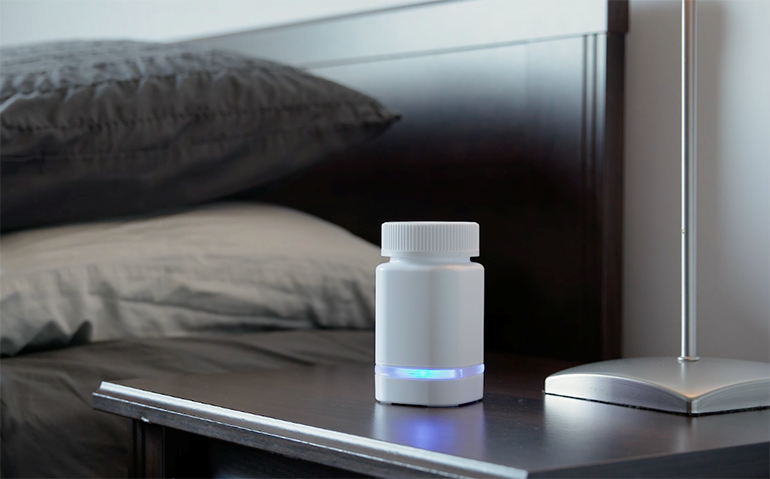
AdhereTech, a medtech company based in New York City, has developed the Aidia Smart Bottle (previously known as the Smart Pill Bottle), a connected pill bottle that helps to increase medication compliance using lights, audio alerts, and text message reminders. The bottle will remind patients to take their medication and remind them if they have missed a dose.
Poor medication compliance can be the decider between disease management and disease progression. During the COVID-19 pandemic many patients with chronic health conditions were not in regular contact with their physicians and other healthcare providers, meaning that compliance with medication may have slipped.
Connected systems, such as the system offered by AdhereTech, help patients to feel more in touch with their healthcare provider and more in control of disease management. The company recently unveiled the Aidia Digital Health System, which is a digital ecosystem that pairs with the Smart Bottle, providing health care staff with information on patient compliance and allowing patients to understand how and why their compliance may suffer.
Medgadget had the opportunity to speak with Chris O’Brien, CEO at AdhereTech about the technology.
Conn Hastings, Medgadget: Please give us an overview of medication adherence and its importance for patient outcomes.

Chris O’Brien, AdhereTech: There’s so much human suffering and so many costs driven downstream in the healthcare system from non-adherence. Staying on therapy as directed by a physician is essential for treatment, especially for people living with chronic health conditions. We know that medicines generally work and will improve lives. We’re blessed to live in a time when there are so many excellent drugs that we can use. However, they don’t work, and they can’t help if you don’t take them.
The issue is that patients with serious diseases leave the doctor’s office with a complex set of instructions about how to take care of themselves, what the medicines are for, when to take them, etc., and from that point forward, they and their caregivers have very little ongoing support. And that’s really what we changed at AdhereTech with the Aidia™ system. We bring support to the patients at home and when they need it.
Medgadget: What effect has the COVID-19 pandemic had on medication adherence, in your opinion? Have more patients fallen off the wagon in terms of taking their pills regularly?
Chris O’Brien: Yes, unfortunately, it’s been a tough time for everybody. At the onset of the pandemic in 2019, the challenge of people taking their medicines regularly and on time grew substantially as the world went into lockdowns, quarantines, social distancing, and a health infrastructure stretched to the breaking point.
One reason for the problem worsening was that many people felt isolated and overwhelmed. Patients fall off their health regimens when they feel a distance from their care teams, particularly those with chronic disease. Remembering to take (and trying to refill) medicines during the pandemic continues to be an issue for people. However, we have encouraging data that demonstrates that those who can stay connected to care through telemedicine, remote patient monitoring, or smart devices feel positively supported. Connected systems like ours can improve lives and outcomes, particularly during this challenging period in human history.
Medgadget: What inspired the company to develop technology to improve medication compliance?
Chris O’Brien: The whole team at AdhereTech is driven to build new technologies that help people reach the best possible health outcomes and to offer patients a continuous connection to care. As you identified earlier, medication compliance is a serious problem, and many solutions have fallen short of helping significant numbers of people stay on track. We knew early on that we could offer a technology to address this problem informed by insights into human behavior and the patient’s mindset. That’s why our system is free to the patient and removes the psychological and practical barriers that prevent many people from staying on track with prescribed medicines. The Aidia system™ requires no setup, no downloads, no learning curve and no new habits or behaviors.
Offering a unique solution like this is what has inspired us since the company was launched in 2011. Our team has extensive experience offering effective digital health solutions and improving patient outcomes. Tackling one of the healthcare system’s most intractable problems, medication adherence, is what we all consider an exciting and worthwhile challenge. And we are succeeding at it.
Medgadget: Please give us an overview of the Aidia Smart Bottle and how it works to improve patient compliance.
Chris O’Brien: The Aidia Smart Bottle, previously known as our Smart Pill Bottle, encourages people to take their medicines through light signals, audible chimes and text message reminders. It also has a built-in cellular chip that provides a real-time connection between the patient, the pharmacy and care teams.
The bottle was designed to be appealing to a far broader group of patients than early tech adopters. Connected technologies can’t just be smart about the tech; they also have to be smart about the people who use them.
Our pill bottle was created with three principles in mind: First, it connects and works the moment the patient receives it with no downloads and no assembly. Second, it works the same way the regular, non-connected version of the device works. In our case, that means it works just like a regular pill bottle, so it is simple and intuitive for the user. And third, the bottle works for a long time without needing to be recharged.
When we first launched our smart bottle, we were a bit ahead of our time. But the industry has since caught up as digital health solutions have become an increasingly accepted part of modern-day living spurred on by the COVID-19 pandemic.
Medgadget: Please give us an overview of the new Aidia Digital Health System, and how it improves the patient experience.
Chris O’Brien: The Aidia System is a proven, integrated, cloud-based technology-based solution that empowers patients and healthcare teams to achieve optimal medication success. We have data that shows, on average, our solution improves the duration of therapy by 26%, fill rates by 9% and dose-level adherence by 15% for some patient groups.
The key to its effectiveness is that Aidia uses real-time data collected passively with smart devices to create customized patient support. As a result, it can teach our whole healthcare system more about why patients skip doses or decline to refill prescriptions, and at the same time, trigger real-time health interventions for patients who need it the most.
The system was developed on the premise that being tech-savvy is not required for patients to benefit from it. Instead, it is designed to effortlessly serve patients of every demographic — young, old, rural, urban, the very ill or the simply forgetful.
The healthcare system is contending with important issues like patient access, health equity, real-world evidence and data collection. The information that the Aidia System passively collects from patients is valuable because it can help us make progress with these issues to the ultimate benefit of patients.
Medgadget: What are your future plans? Do you have any plans for new devices or digital tools that could contribute to the connected ecosystem you are cultivating?
Chris O’Brien: In the coming years, our focus will be on further developing the devices that connect to our Aidia System and the quality of the real-time data we can capture and share with our customers. This data will help them make their medicines and services even better in the future.
We have a world-class product engineering team that is constantly iterating, working on new products that will take a variety of form factors that medicines take so as many patients as possible can benefit.
Medication adherence is not only crucial for the success of commercialized products. It is also fundamental to the clinical trials that help new therapies reach the market. Therefore, in the near future, we also see an opportunity to expand the ways our Aidia System is used, including improving medication adherence in clinical trials that help new therapies reach the market.

Link: AdhereTech homepage…
